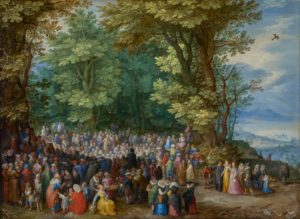Thoughts on the Lessons for All Saints C, Nov. 1, 2019
(All Saints’ Day may also be celebrated on the Sunday following Nov. 1.)
First Reading: Daniel 7:1-3; 15-18
We remember all saints, known and unknown, on November 1, All Saints’ Day. As one of the seven principal feasts of the church year, its observance may be moved to the following Sunday.

The Sermon on the Mount (1598), oil painting on copper by Jan Brueghel the Elder (1568-1625). The J. Paul Getty Museum, Los Angeles. (Click image to enlarge.)
The first reading from the book of Daniel, one of the last books in the Old Testament, resembles the style of Revelation. Its contemporaries would have recognized its then-popular genre as symbolic, not literal. In these verses, Daniel tells of a vivid dream about four alarming beasts that represent earthly kings, a terrifying vision that left his spirit troubled. But the nightmare ends with reassurance as we recall all who have died and gone to their eternal rest: God will win and reign forever.
Psalm: Psalm 149
Shouting out praise for God’s glory, we join the Psalmist in a new song with full hearts and voices, worshiping God so fully that the people physically embody their prayer in dance, music and song. We rejoice that God takes pleasure in us; we praise God who lifts up the poor. But then the short Psalm takes a sudden turn that might remind us of an ancient vision of Judgement Day: It recognizes God not only as protector of the faithful but also as stern judge of all who’ve turned against God’s way.
Second Reading: Ephesians 1:11-23
Christ is King, and God has placed him at God’s right hand to rule over us all, the author of Ephesians assures his flock, writing to the persecuted Christians of Asia Minor in Paul’s name. From that time onward, the author assures them, all the people of God, baptized in Christ and sealed by the Spirit, are the saints of God. We are Christ’s body on earth, pledged through our inheritance through baptism to redemption as God’s own people.
Gospel: Luke 6:20-31
As we hear Luke’s version of the Beatitudes in Jesus’ Sermon on the Plain, compare it in your mind with Matthew’s familiar narrative in the Sermon on the Mount. Matthew’s account shows Jesus guiding us toward service and neighborly love. We can find that in Luke’s view as well. But Luke’s version, as we might expect from the evangelist who told us of Mary’s Magnificat and Jesus’ first sermon in Nazareth, is more directly focused on caring for the poor and the oppressed; not just Matthew’s “poor in spirit” but those who actually have no money, no resources. Luke calls us to give food to the hungry and water to the thirsty as well as standing with those who “hunger and thirst for righteousness.” Don’t just turn the other cheek: Forgive your enemies, and pray for them. In Luke’s Beatitudes, doing unto others is not easy, but it is essential. It binds us as the people of God.
